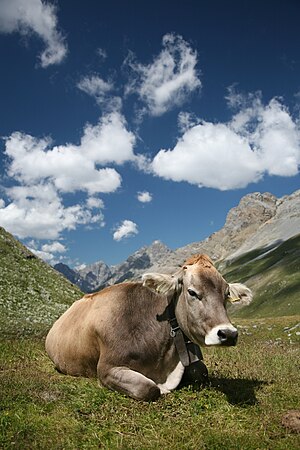 Image via Wikipedia
Image via WikipediaThree reasons why dairy should go down the drain
I am against the idea for several very simple reasons – smells, carbon footprint and jobs.
If the dairy is only going to reduce costs by 10 per cent, why bother?
Canny Scottish farmers are already achieving such savings with herds of no more than 100 cows by installing robot milking parlours.
Guess what – the cows approach the robot when the cow decides it is time to be milked and choose to do so three times a day.
At each milking, the cow is computer monitored for health and the correct amount of food and, in return, gives the farmer more milk for his bucks.
There are a number of advantages to this approach. The cows can collect their own breakfast in the summer months, there are no problems with the neighbours and no logistical problems in getting rid of the slurry.
There are strict legal requirements to be met when slurry is spread on the land and this can be managed easily with a herd of 100 cows.
However, all sorts of problems – including the weather – would make the task more difficult for 8,000. Hence the potential problem with smells.
Secondly, we, the public, are under pressure all the time to reduce our carbon footprint – in our homes, on our holidays and in our cars.
Yet this project will add hundreds of tonnes of carbon to the yearly ratings.
It must surely be far more efficient to let cows fetch their own food, rather than bring it to them in a lorry.
If a carbon tax is introduced, I hope it is added to unnecessary lorry and tractor miles for tasks such as this.
Such a tax would soon transform an 8,000-cow dairy from being a cash- maker to a loss-making enterprise.
Finally, Lincolnshire has two big industries – farming and tourism.
With an annual value of about £1.6bn, farming is the bigger. Tourism is just a whisker under £1bn.
As far as jobs are concerned, the figures are reversed, with 10,000 in agriculture and 17,000 in tourism.
If Lincoln became known as Stinkin Linkin, tourism would certainly suffer.
A small 2.5 per cent drop in visitor numbers could equate to 425 jobs.
That is why Arrow Rock, Missouri, set up a 15-mile exclusion zone from the town centre for such enterprises, to protect its tourist trade. Lincoln should do the same.
Lincolnshire tourism suffered badly in the last foot and mouth epidemic, so why create unnecessary problems now?
While economies of scale appear great at first sight, I would imagine any business this size would be even more vulnerable to supermarket pressure on price than more flexible, smaller units.
Even with 8,000 cows, the dairy will not have power over the market.
Perhaps the directors of Nocton Dairies Ltd could take a trip to Scotland before submitting their application and see how the canny Scottish farmers make more money out of milk and see how they could revise their plans so we could all be happy.
CHRISTOPHER DARCEL Holmfield, Fiskerton.


No comments:
Post a Comment